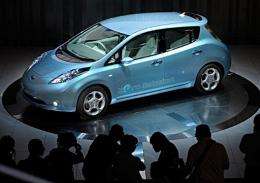Nissan's 'Leaf' to challenge Toyota's Prius (Update)

Nissan's upcoming all-electric car could outsell hybrids like Toyota's Prius even though it can't drive more than about 100 miles (160 kilometers) without stopping to recharge, a senior executive said.
That's because, unlike more expensive hybrids, owners of the zero-emission Leaf will be able to save money while saving the environment, said Larry Dominique, Nissan North America's vice president for product planning.
"Hybrids won't get you there, range extended (plug-in hybrids) won't get you there," Dominique told reporters on the sidelines of an automotive conference in Traverse City, Michigan.
"They're good technologies, but for the mass market appeal, they have much bigger obstacles, especially on upfront cost."
Hybrids currently account for about two percent of global auto sales. Nissan expects electric vehicles to swallow ten percent of the global market by 2016 to 2020.
"We are very confident that Leaf will give you a lower cost to ownership," Dominique said on the margins of the CAR Management Briefing Seminar.
Nissan plans to sell the midsized Leaf hatchback for somewhere in the 25,000- to 33,000-dollar range.
That's slightly more than the current price of the Prius but up to 20,000 dollars less than the expected cost of the Volt, General Motors' plug-in hybrid.
The savings also come in the cost of refueling: even in the most expensive electricity markets, most drivers should be able to charge their Leaf at home for less than a dollar.
And even if gasoline prices were to fall below 1.10 a gallon, most vehicles would still cost more to fuel than the Leaf, Dominique said.
Nissan will introduce the Leaf to business and government fleet customers in the United States, Japan and Europe next year.
It is also working with a number of utility companies and local governments to set up public recharging stations so the Leaf can be sold to consumers as soon as late 2010. The Leaf is targeted for a mass market release in 2012.
Dominique acknowledged that it will be a challenge to mass market a limited-range vehicle in the geographically spread out United States.
But the current range will be sufficient to meet the daily commuting needs of the vast majority of drivers and it comes at a time when a growing number of US consumers are concerned about cutting their carbon footprint, he said.
"It's going to be hard to convince the guy who lives in Butte, Montana who has to drive 40 miles to the grocery store to buy an electric vehicle," Dominique said.
"We do believe that we're at this tipping point where if we bring in the right technology at the right price with the right execution... that we'll be able to convince people this is a great alternative."
Owners will be able to recharge the battery at home through the domestic power supply in about eight hours, or top it up to 80 percent capacity in around 30 minutes at planned electric recharging stations.
Among other features, drivers will be able to use their mobile telephones to turn on the air conditioning and set the battery charging functions.
If they need help finding the nearest charging station, the navigation system will point the way.
Nissan, Japan's third largest automaker, was slower than Toyota and Honda to embrace fuel-sipping petrol-electric hybrids, but it is determined to steal a march on its larger competitors in zero-emission cars.
The dream of an electric car, which has been around since the time of Thomas Edison, has so far failed to break into the mainstream because of limited battery life and high costs.
Technological breakthroughs in the development of long-lasting lithium-ion batteries have significantly and lowered the cost of electric vehicles and increased their range and top speed potential.
The Leaf will not be the first mainstream electric car on the market. Mitsubishi Motors recently rolled out its "i-MiEV" minicar while Fuji Heavy Industries launched the Subaru plug-in STELLA.
(c) 2009 AFP




















